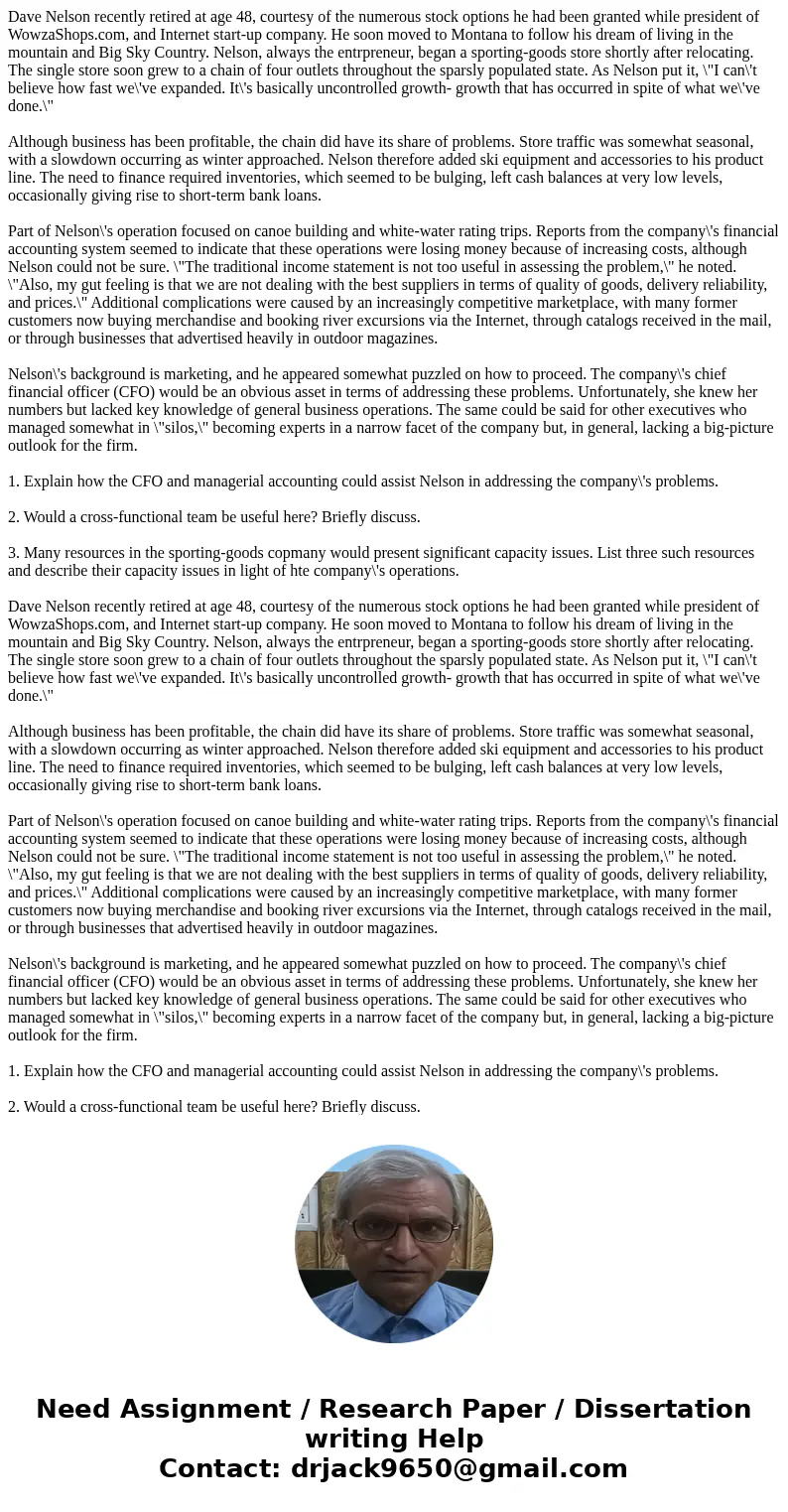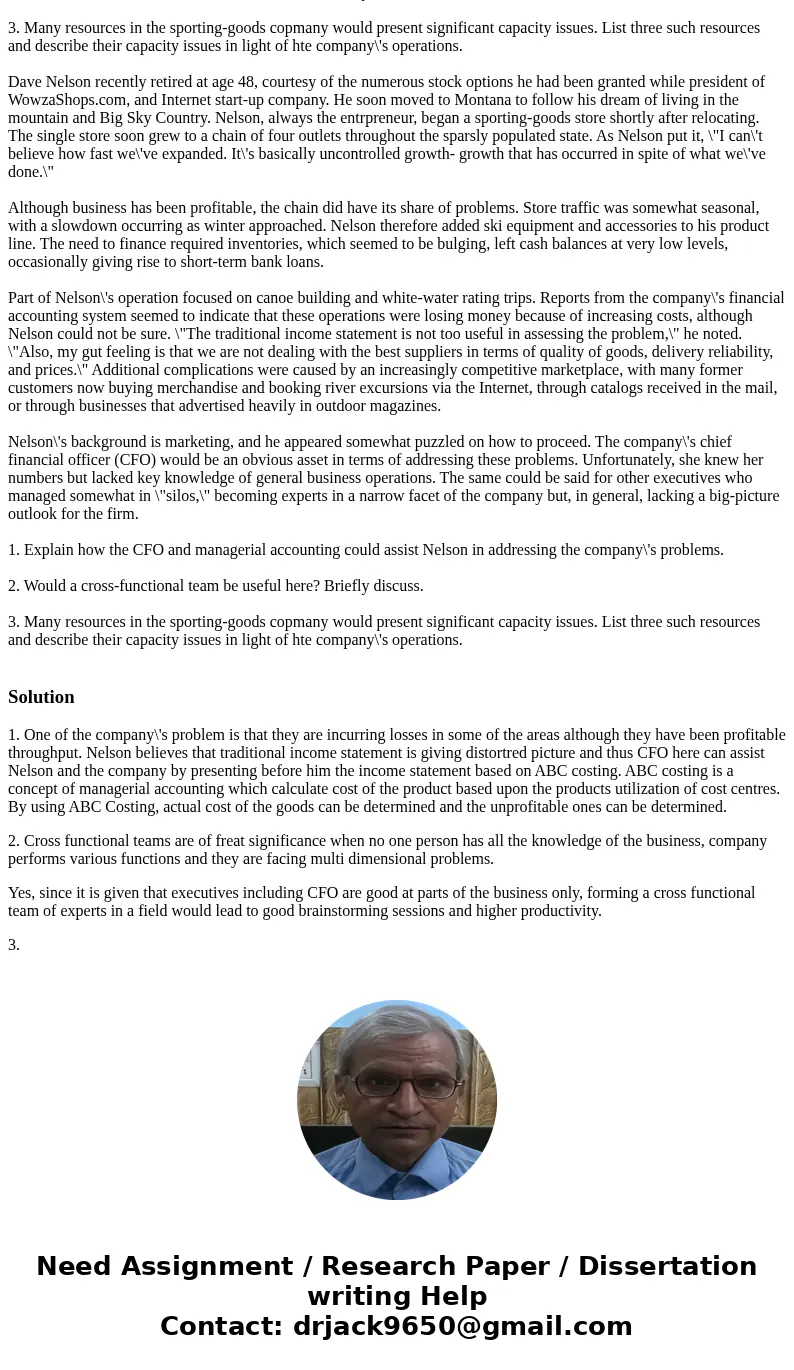Dave Nelson recently retired at age 48, courtesy of the numerous stock options he had been granted while president of WowzaShops.com, and Internet start-up company. He soon moved to Montana to follow his dream of living in the mountain and Big Sky Country. Nelson, always the entrpreneur, began a sporting-goods store shortly after relocating. The single store soon grew to a chain of four outlets throughout the sparsly populated state. As Nelson put it, \"I can\'t believe how fast we\'ve expanded. It\'s basically uncontrolled growth- growth that has occurred in spite of what we\'ve done.\"
Although business has been profitable, the chain did have its share of problems. Store traffic was somewhat seasonal, with a slowdown occurring as winter approached. Nelson therefore added ski equipment and accessories to his product line. The need to finance required inventories, which seemed to be bulging, left cash balances at very low levels, occasionally giving rise to short-term bank loans.
Part of Nelson\'s operation focused on canoe building and white-water rating trips. Reports from the company\'s financial accounting system seemed to indicate that these operations were losing money because of increasing costs, although Nelson could not be sure. \"The traditional income statement is not too useful in assessing the problem,\" he noted. \"Also, my gut feeling is that we are not dealing with the best suppliers in terms of quality of goods, delivery reliability, and prices.\" Additional complications were caused by an increasingly competitive marketplace, with many former customers now buying merchandise and booking river excursions via the Internet, through catalogs received in the mail, or through businesses that advertised heavily in outdoor magazines.
Nelson\'s background is marketing, and he appeared somewhat puzzled on how to proceed. The company\'s chief financial officer (CFO) would be an obvious asset in terms of addressing these problems. Unfortunately, she knew her numbers but lacked key knowledge of general business operations. The same could be said for other executives who managed somewhat in \"silos,\" becoming experts in a narrow facet of the company but, in general, lacking a big-picture outlook for the firm.
1. Explain how the CFO and managerial accounting could assist Nelson in addressing the company\'s problems.
2. Would a cross-functional team be useful here? Briefly discuss.
3. Many resources in the sporting-goods copmany would present significant capacity issues. List three such resources and describe their capacity issues in light of hte company\'s operations.
Dave Nelson recently retired at age 48, courtesy of the numerous stock options he had been granted while president of WowzaShops.com, and Internet start-up company. He soon moved to Montana to follow his dream of living in the mountain and Big Sky Country. Nelson, always the entrpreneur, began a sporting-goods store shortly after relocating. The single store soon grew to a chain of four outlets throughout the sparsly populated state. As Nelson put it, \"I can\'t believe how fast we\'ve expanded. It\'s basically uncontrolled growth- growth that has occurred in spite of what we\'ve done.\"
Although business has been profitable, the chain did have its share of problems. Store traffic was somewhat seasonal, with a slowdown occurring as winter approached. Nelson therefore added ski equipment and accessories to his product line. The need to finance required inventories, which seemed to be bulging, left cash balances at very low levels, occasionally giving rise to short-term bank loans.
Part of Nelson\'s operation focused on canoe building and white-water rating trips. Reports from the company\'s financial accounting system seemed to indicate that these operations were losing money because of increasing costs, although Nelson could not be sure. \"The traditional income statement is not too useful in assessing the problem,\" he noted. \"Also, my gut feeling is that we are not dealing with the best suppliers in terms of quality of goods, delivery reliability, and prices.\" Additional complications were caused by an increasingly competitive marketplace, with many former customers now buying merchandise and booking river excursions via the Internet, through catalogs received in the mail, or through businesses that advertised heavily in outdoor magazines.
Nelson\'s background is marketing, and he appeared somewhat puzzled on how to proceed. The company\'s chief financial officer (CFO) would be an obvious asset in terms of addressing these problems. Unfortunately, she knew her numbers but lacked key knowledge of general business operations. The same could be said for other executives who managed somewhat in \"silos,\" becoming experts in a narrow facet of the company but, in general, lacking a big-picture outlook for the firm.
1. Explain how the CFO and managerial accounting could assist Nelson in addressing the company\'s problems.
2. Would a cross-functional team be useful here? Briefly discuss.
3. Many resources in the sporting-goods copmany would present significant capacity issues. List three such resources and describe their capacity issues in light of hte company\'s operations.
Dave Nelson recently retired at age 48, courtesy of the numerous stock options he had been granted while president of WowzaShops.com, and Internet start-up company. He soon moved to Montana to follow his dream of living in the mountain and Big Sky Country. Nelson, always the entrpreneur, began a sporting-goods store shortly after relocating. The single store soon grew to a chain of four outlets throughout the sparsly populated state. As Nelson put it, \"I can\'t believe how fast we\'ve expanded. It\'s basically uncontrolled growth- growth that has occurred in spite of what we\'ve done.\"
Although business has been profitable, the chain did have its share of problems. Store traffic was somewhat seasonal, with a slowdown occurring as winter approached. Nelson therefore added ski equipment and accessories to his product line. The need to finance required inventories, which seemed to be bulging, left cash balances at very low levels, occasionally giving rise to short-term bank loans.
Part of Nelson\'s operation focused on canoe building and white-water rating trips. Reports from the company\'s financial accounting system seemed to indicate that these operations were losing money because of increasing costs, although Nelson could not be sure. \"The traditional income statement is not too useful in assessing the problem,\" he noted. \"Also, my gut feeling is that we are not dealing with the best suppliers in terms of quality of goods, delivery reliability, and prices.\" Additional complications were caused by an increasingly competitive marketplace, with many former customers now buying merchandise and booking river excursions via the Internet, through catalogs received in the mail, or through businesses that advertised heavily in outdoor magazines.
Nelson\'s background is marketing, and he appeared somewhat puzzled on how to proceed. The company\'s chief financial officer (CFO) would be an obvious asset in terms of addressing these problems. Unfortunately, she knew her numbers but lacked key knowledge of general business operations. The same could be said for other executives who managed somewhat in \"silos,\" becoming experts in a narrow facet of the company but, in general, lacking a big-picture outlook for the firm.
1. Explain how the CFO and managerial accounting could assist Nelson in addressing the company\'s problems.
2. Would a cross-functional team be useful here? Briefly discuss.
3. Many resources in the sporting-goods copmany would present significant capacity issues. List three such resources and describe their capacity issues in light of hte company\'s operations.
1. One of the company\'s problem is that they are incurring losses in some of the areas although they have been profitable throughput. Nelson believes that traditional income statement is giving distortred picture and thus CFO here can assist Nelson and the company by presenting before him the income statement based on ABC costing. ABC costing is a concept of managerial accounting which calculate cost of the product based upon the products utilization of cost centres. By using ABC Costing, actual cost of the goods can be determined and the unprofitable ones can be determined.
2. Cross functional teams are of freat significance when no one person has all the knowledge of the business, company performs various functions and they are facing multi dimensional problems.
Yes, since it is given that executives including CFO are good at parts of the business only, forming a cross functional team of experts in a field would lead to good brainstorming sessions and higher productivity.
3.


 Homework Sourse
Homework Sourse